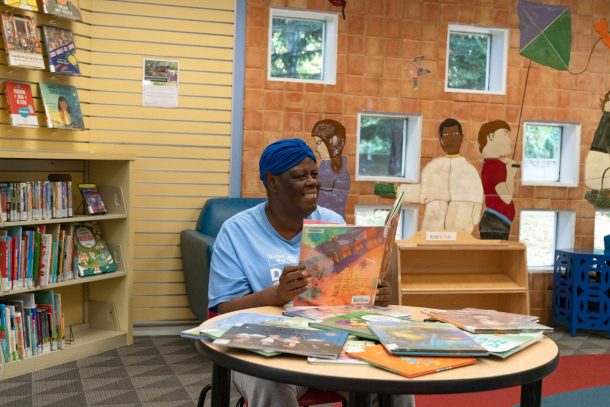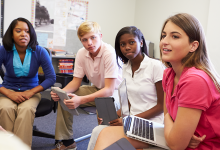
By Genoa Barrow | Sacramento OBSERVER Senior Staff Writer
Veronica Cofer’s first grandchild is due in November and the former accountant is already planning the little girl’s college fund.
Along with frilly frocks and woke onesies she’ll get from others, grandma also plans to supply the child with plenty of books. And being born in a digital age, baby Cofer may likely be the one bringing her Nanna into the 21st century and the tech that has come with it.
Cofer, 68, has a cellphone, but prefers a landline. She’s had an iPad, but is only starting to use it.
“I’m old school and I know it,” Cofer said.
“My brother and his wife are into all of that technology, so they force me to have it and I’m supposed to be grateful, which is not what I am,” she said with a little bit of humor mixed with the realness one gets from being born in the inner city of Baltimore.
Cofer’s family gets her a new phone just as she’s learning how to use her current one. She’s from the ‘If It Isn’t Broke, Why Fix It?’ school of thought.
“What advantage does it give me? I had an iPhone originally and I dropped it and cracked it. I could have gotten (another one), but I didn’t do any more with the iPhone than I did with a flip phone,” she shared.
Long before either of those devices became commonplace, Cofer came to the Sacramento area in the U.S. Air Force, where she served as an aircraft mechanic. She married and divorced. She was an accountant for the State of California for nearly 20 years and retired in 2017.
Cofer was an active parent when her two sons were young and often volunteered on their campuses. Both are grown and married now, with master’s degrees and careers.
Education is important in the Cofer family and it starts from the top. Veronica Cofer originally wanted to be a kindergarten teacher. In retirement, she volunteers to teach children to read. She was serving through a program called Reading Partners that worked with local schools, until it stopped operating locally in June 2020.
Cofer prefers in-person interaction, but is now in training with the United Way California Capital Region’s Students and Tutors Achieving Reading Success (STARS) and BookNook, which is virtual.
Because of distance learning during the pandemic, a lot of children fell behind or didn’t get off to a good academic start in 2020. “For the kids that really need help, Zoom is not gonna work,” Cofer said.
The outlook was bad even before the pandemic, she says. “For a while I was working at Mather (Air Force Base). They had a program where we were reading and grading kids’ papers. It was Sacramento, from kindergarten to high school; it was the saddest thing I have ever seen in my life because they can’t read and write. They graduate without being able to, because (teachers) have to have permission to fail a kid.”
According to recent data from the California Reading Coalition, the state consistently ranks at the bottom in reading for the third and fourth grades.
Preparedness isn’t just on the schools, she says.
“I made sure my kids could read before they got to kindergarten,” Cofer said.
“It doesn’t make sense to me. If they can’t read by third grade, they’re in special programs.
Our kids need whatever it takes to get them (on track) because they are lost. Any kid is lost without being able to read. They’re quick to label them. That’s why I want us to be represented. I want people to see that yes, we do care about our kids and we’re willing, I’m willing, to do whatever.”
Some kids are ready to do whatever it takes to learn, some aren’t. Cofer is patient, but she’s nobody’s fool. “Many of them have learned to ‘work’ the teachers. The teachers don’t always expect a lot from our kids and the kids know that,” she said.
Cofer recalls accompanying a class on a field trip to San Francisco and seeing students’ behavior up close. They tried to give her the same treatment, but were met with some good, old-fashioned Black mama astuteness. “I told the kids, ‘I’m not your teacher, don’t play with me.’ I used to tell my kids, ‘Do I look like I’m playing with you?’”
Bad behavior doesn’t mean students aren’t capable of succeeding. “They expect our kids to act up, that’s why you have to let them know, ‘No, that’s not what we expect. We know you can do better.”
Cofer’s sons used to complain that she “expected too much” from them. She was quick to correct them.
“It was always, ‘No, I don’t. I grew up with you. I know what you can do.”
She now uses the same approach with the young people she tutors in reading. Reading has to be made normal, she says,
“It shouldn’t be a chore for a kid. You’ve got to start them young.”
Cofer will practice what she preaches when her granddaughter arrives, whether it’s with a book she can hold in her hand or on a hand-held device.
“Anybody who comes in this house has to have books. Reading is not optional.”STARS is looking for more local volunteers to teach students. For information, visit YourLocalUnitedWay.org/STARS.
The post Area Senior Keeps It ‘Old School’ appeared first on The Sacramento Observer.










